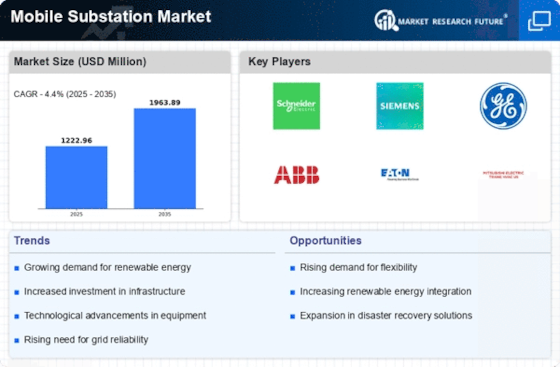Top Industry Leaders in the Mobile Substation Market

*Disclaimer: List of key companies in no particular order
Latest Company Updates:
Competitive Landscape of Mobile Substation Market: Power Play & Emerging Dynamics
The mobile substation market this dynamic space is marked by a diverse group of players, each vying for a piece of the pie. Understanding their strategies, analyzing market share factors, and identifying emerging trends is crucial for navigating this competitive landscape.
Key Players and Their Strategies:
Global Giants: Leading names like ABB, Siemens, and GE leverage their established brand reputation, extensive product portfolios, and global reach to secure sizable market shares. They focus on continuous innovation, offering technologically advanced and customized mobile substations to cater to evolving needs. ABB's PowerLink solution exemplifies this, providing compact and eco-friendly mobile substations for renewable energy integration.
Regional Champions: Players like Delta Star (US), Jacobsen Elektro (Norway), and Efacec (Portugal) dominate specific regions by capitalizing on strong local presence, understanding niche requirements, and offering cost-effective solutions. Delta Star, for instance, caters to the unique needs of the North American market with its focus on fast deployment and rugged designs.
Niche Specialists: Smaller companies like Ampcontrol (Australia) and Matelec Group (Lebanon) carve out space by specializing in specific application areas like mining, oil & gas, or data centers. Their deep understanding of these sectors enables them to offer tailored solutions that larger players might overlook. Ampcontrol's expertise in harsh environment substations for mining operations is a prime example.
Factors Shaping Market Share:
Product Portfolio and Innovation: Offering a diverse range of mobile substations catering to various voltage levels, capacities, and applications is crucial. Continuous R&D to enhance efficiency, reduce size, and integrate smart technologies like digitalization and automation fosters a competitive edge.
Geographical Presence and Distribution Network: A strong global reach with efficient distribution channels ensures faster delivery and better after-sales support, especially for time-sensitive deployments. Delta Star's extensive rental fleet across North America is a testament to this approach.
Pricing and Financial Flexibility: Competitive pricing strategies and flexible financing options like leasing or pay-per-use models make mobile substations accessible to a wider range of customers. Jacobsen Elektro's focus on cost-effective solutions tailored for developing economies is a case in point.
Sustainability and Environmental Focus: The growing emphasis on green energy is leading to demand for eco-friendly mobile substations with minimal environmental impact. ABB's PowerLink solution, with its focus on reducing noise and emissions, exemplifies this trend.
Emerging Trends and Innovations:
Integration with Renewable Energy: Mobile substations are playing a key role in facilitating the integration of renewable energy sources like solar and wind power into the grid. Compact and adaptable units are ideal for temporary or remote renewable energy installations.
Smart Grid Technologies: The adoption of smart grid technologies like IoT and remote monitoring is transforming mobile substations. Enhanced data analytics and communication capabilities optimize performance, improve reliability, and enable predictive maintenance.
Standardization and Modularization: Efforts towards standardization of components and modular designs aim to reduce lead times, simplify manufacturing, and facilitate faster deployment. This benefits both manufacturers and consumers by streamlining the process.
Hybrid and Multi-fuel Solutions: Hybrid mobile substations, combining traditional transformers with renewable energy sources like diesel generators or battery storage, are gaining traction. They offer greater flexibility and reliability, especially in remote or emergency situations.
Overall Competitive Scenario:
The mobile substation market is characterized by dynamic competition, with established players constantly innovating and regional champions carving out niches. The emergence of new trends like renewable energy integration and smart grid technologies presents exciting opportunities for growth. Companies that adapt to these changes, focus on customer-centric solutions, and maintain a balance between innovation and affordability will be well-positioned to thrive in this rapidly evolving landscape.
GOOD (Hong Kong):
• December 2023: Launched a new series of compact mobile substations specifically designed for urban environments. (Source: GOOD press release)
Delta Star (US):
• October 2023: Partnered with a European manufacturer to offer hybrid mobile substations combining traditional transformers with battery storage. (Source: Delta Star website)
Powell Industries (US):
• November 2023: Unveiled a new line of mobile substations with advanced digital control systems and enhanced cybersecurity features. (Source: Powell Industries press release)
Jacobsen Elektro (Norway):
• December 2023: Received an order for mobile substations from a Scandinavian wind farm project. (Source: Jacobsen Elektro website)
AZZ Inc. (US):
• October 2023: Acquired a smaller mobile substation manufacturer, expanding its product portfolio and market reach. (Source: AZZ Inc. press release)
Top listed global companies in the industry are:
GOOD (Hong Kong)
Delta Star (US)
Powell Industries (US)
Jacobsen Elektro (Norway)
AZZ Inc. (US)
Tadeo Czerweny (Argentina)
EKOS Group (Turkey)
Elgin Power Solutions (US)
Efacec (Portugal)
Matelec Group (Lebanon)
Ampcontrol Pty Ltd. (Australia)
Aktif Group (Turkey)
Unit Electrical Engineering (UEE) (Canada)
PME Power Solutions (India)










